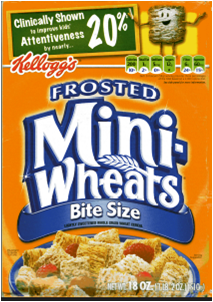Welcome to UBC Blogs. This is your first post. Edit or delete it, then start blogging!
Monthly Archives: September 2013
Kellogg’s unethical marketing
Competition between different companies can occur in many different ways. One of the most popular ways is through aggressive marketing of their own product, which has proved to be very successful in giving each company their competitive edge. In fact, such aggressive marketing have inevitably let to these companies continually trying to reinvent their marketing direction, which has caused some of them to conduct unethical marketing practices. Such practices have been widely disapproved and one example would be in Kellogg’s marketing policies.
Kellogg is a world-renowned brand, particular famous for the various cereal products that they offer. However, they have attempted to market their children cereals in a very unethical fashion. They stated that their frosted mini-wheats have been clinically shown to improve kids’ attentiveness by 20 percent.
 As seen from above, the supposed benefits from eating the cereal would have convinced many consumers to purchase the frosted mini-wheats for their children. However, most of them have been unaware of the fact that the clinical test was done for a group of children who only had water for breakfast against another group who had the cereal. As it is obvious that children will not only have water for breakfast, the claim has been made in an unethical manner.
As seen from above, the supposed benefits from eating the cereal would have convinced many consumers to purchase the frosted mini-wheats for their children. However, most of them have been unaware of the fact that the clinical test was done for a group of children who only had water for breakfast against another group who had the cereal. As it is obvious that children will not only have water for breakfast, the claim has been made in an unethical manner.
Thus, it is my opinion that such unethical marketing is very misleading and may harm consumer well-being. Kellogg’s may not be legally wrong in such forms of marketing, but it definitely is not right in misleading their customers. However, it is difficult to regulate such forms of marketing as it is difficult to differentiate ethical and unethical marketing. Thus, the onus would be on the individual company to market their product in a manner where they feel will not harm the welfare of their customers.
